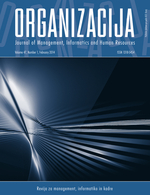The Determinants of Employee Ownership Plan Implementation in EU Countries – the Quest for Economic Democracy: a First Look at the Evidence
Abstract
Background and purpose: Kelso’s quest to identify the economic counterpart of political democracy and, as a corollary, his concern about the nature of the economic system’s organisation needed to support the institutions of a politically free society, contributed two important terms: economic power and democracy. Following Kelso’s reasoning, my research study aims to understand the determinants of the implementation of economic democracy, measured by the incidence of employee share ownership plans, within European Union countries.
Methodology: Setting out with the theory of one of the founding fathers of employee stock ownership plans, I perform a cross-country analysis spanning five years (2008–2012) to explain the incidence level of employee ownership by independent variables operationalizing the political, legal, socio-educational and economic structures of twenty European Union countries. Using secondary data from the European Federation of Employee Share Ownership, I explain the determinants’ pertinence, while accounting for severe data limitations.
Results: I report a strong correlation between employee ownership incidence and the index of economic freedom. However, the labour market’s freedom, the trustworthiness of and confidence in financial markets and the quality of secondary and tertiary education do not deliver clear-cut results.
Conclusion: Further research should comprehensively scrutinise country-specific factors regarding corporate governance issues and cross-cultural controls. Employee ownership researchers should consider this field of research to understand why countries that are so-called employee ownership champions are experiencing widening income inequality.
Methodology: Setting out with the theory of one of the founding fathers of employee stock ownership plans, I perform a cross-country analysis spanning five years (2008–2012) to explain the incidence level of employee ownership by independent variables operationalizing the political, legal, socio-educational and economic structures of twenty European Union countries. Using secondary data from the European Federation of Employee Share Ownership, I explain the determinants’ pertinence, while accounting for severe data limitations.
Results: I report a strong correlation between employee ownership incidence and the index of economic freedom. However, the labour market’s freedom, the trustworthiness of and confidence in financial markets and the quality of secondary and tertiary education do not deliver clear-cut results.
Conclusion: Further research should comprehensively scrutinise country-specific factors regarding corporate governance issues and cross-cultural controls. Employee ownership researchers should consider this field of research to understand why countries that are so-called employee ownership champions are experiencing widening income inequality.
Refbacks
- There are currently no refbacks.

